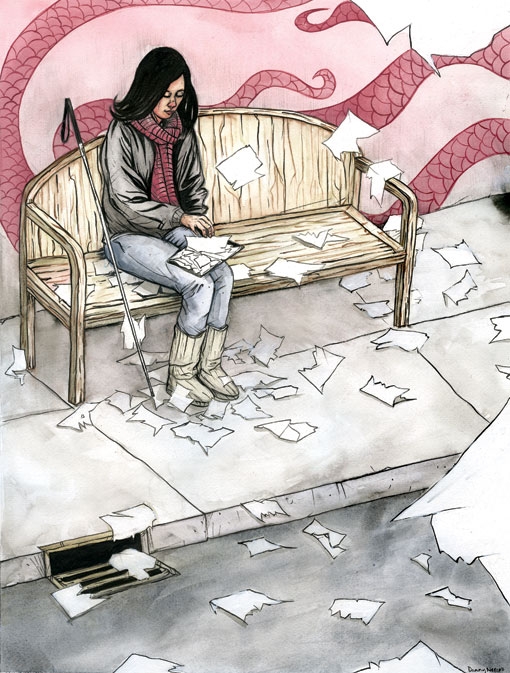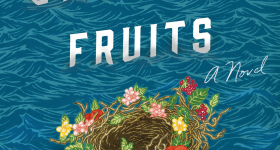SHE is not blind but getting there. She knows this. She knows it by the way people touch her like a banged-up porcelain doll. She knows it because she will be a teenager soon. She knows it so bad that she’s given up looking.
HE is fucking his palm, thinking of Judy Garland. He is wondering what makes a bad man so bad. He is wondering what makes old, old. He is wondering how he became both so fast, like this, without even noticing.
She is blindfolded every morning. Upon waking, the Instructors knot thick bandages over the children’s faces, asking them to bow their shoes, tie their ties, listen for space. In class the children clench ribbons and strut circles around Instructor 12, wrapping her like a maypole mummy. This is time, This is direction, This is a cycle. If one subject trips the rest are told to step over the little body. You should feel it before you fall.
Bodies, the ones he knew before he got here: Katherine Hepburn’s legs, Audrey Hepburn’s back, Natalie Wood’s torso, Jackie O’s hands, Greta Garbo’s eyebrows, Billie Holiday’s hair, Marilyn Monroe’s bust, Vivienne Leigh’s scowl, Bette Davis’ eyes, Doris Day’s cheeks, Rita Hayworth’s lips, Liz Taylor’s lashes. Yes, that stare, he thinks, I remember that best.
There is a secret on the left side of her bed. She once asked an Instructor: What do you call something you want for yourself? She usually kept it covered with a picture of the president. But at night, it’s all hers, the small numbers carved into the wooden frame. She traces it with her fingers, licks the dust inside the lines. She wonders who did it, what tool, if it was a secret for them too.
The bars of a cell are nothing like the movies. Before movies stopped, he had seen them all. The bars in here go on forever. He thinks about this when he counts them, at lights-out, sitting in the dead dark. With every year he swears there are more. He swears he could measure his life by them, like tree rings, like teeth.
When she can’t sleep, she writes. She is writing the story of her life in a small white notebook. This is not allowed. There once lived a girl in a school with no windows. This is the only home the girl knows. She has many Instructors without any names. They are teaching her to be perfect. Her eyes will be removed soon, even though they are fine. Everyone in the school calls her pretty. She’s been told she will change the world, soon enough, soon. She wears a number. It matches the secret on the side of her bed. Once, someone taught her to dance. She thinks she must have dreamt this.
He is arranging a picture with the food on his plate: a tongue made of peas and baby carrot fangs. He could have been an artist. He is telling his cellmate: Yes, I could have been. His cellmate replies: So could’ve I. They have been living together for 58 years. They are pretending to be strangers. Sometimes, at night, they try on new lives: I once dug up Pompeii. I once saved a broken bird. My mother used to love me and need me and kiss me hard but I’d forgotten ’til now. And anyway, she only told me once.
Outside the school with no windows, the world is black and white. She has now seen two glimpses of it. The other subjects are sleeping and she is looking through a keyhole at a room she shouldn’t know. The Instructors are gathered around a glowing square with small black and white people inside. They are using words like: Hush, Volume, Play.
He is talking in his sleep in his last sleep here. He is saying: Love me, Love me. In the bunk under his, his cellmate says: What’s the point. There is a mouse running around, sniffing for things left behind. The night guard is on the phone. On the phone, the night guard is saying: You awake, Sweetheart? It’s me.
On the operating table, they tell her to count back from 100. There is a new nurse and an old doctor. The new nurse fumbles with a needle. The old doctor holds the girl’s hand, says: Backward, relax, nice and slow. She is thinking about what the Instructors have told her: It’ll be like sleepwalking from now on, that’s all. These are the last things she will ever see: a dirty lamp staring at her, the long needle fishing for a vein, rubber gloves, metal claws, a small orange cooler that will take them away. The old doctor lifts his mask. He is saying: Just keep counting ’til you can’t.
On the operating table, they tell him to stay still. There is a new nurse and an old doctor. The new nurse is strapping leather belts over his wrists. The old doctor says: One last checkup and you’re free. But he has never seen a doctor in all these years. Not when he hacked up blood for days, not when something felt amiss with his heart, not when a cheating poker hand resulted in a broken arm. They will not answer any of his questions. He cannot remember a time anyone did. The new nurse is pulling more leather over his shoulders, neck, mouth, locking his head into place. A small orange cooler and black trash bag lie next to him. The old doctor lifts metal claws up to the lamp, pulls a mask down over his mouth, mumbles something about having to do this on Thanksgiving. He uses the word: Ungrateful.
On the operating table, they flip a coin. The new nurse says: Call it. The old doctor says: Heads. The coin lands. The new nurse loses. The old doctor leaves the room, turning on a stereo by the door. Soft violins and a flute. The nurse fingertips the bloody bandage. She pulls a plush teddy bear from a box beneath the table and places it in the girl’s sleeping arms: Poor, poor little creature. In a deep breath, she crosses herself, says a prayer and whispers down to the child’s swollen face: Time to wake up, isn’t the music lovely? Outside the room, the doctor waits for a cry.
On the operating table, he wakes in a jolt. There is a new nurse and an old doctor. The new nurse says: We have given you the greatest gift. The old doctor says: Now get going, Go. He doesn’t recognize this room, these words, his own feet, the headache. They are using words like: Miracle, Memory, Saved. They are lying. He is handed a mirror, a history book, maps of the outside streets, sunglasses. They come from a box next to a box full of bears. Walking toward the hospital exit, he cannot remember ever remembering. The new nurse shakes his hand, says: Now go be a good man. Enjoy the new view. At the door, he catches his own reflection in the glass. He has never seen this face, this smile, these bright blue eyes that don’t quite fit.
She is living in a new tower in the school with no windows. They call it Section-B. She knows this is the home for blind boys and girls — where gifts arrive, Sorry’s are whimpered, no more secrets reside. She is able to come and go as she pleases. She has decided to spend her days in bed. She listens to others stumble to the ground, cry for help, smack into the walls. She cannot remember the last time she moved. The Section-B Instructors seem to have given up, yet still they tell her: Do not give up! Do not! In this new home, they do not wear numbers. Instead, they are called, The Blessings.
You are a chosen one! You are a lucky one! You will be remembered as someone special. The town has welcomed him with open arms, open homes, Thank you’s. Everybody loves him.

She trusts food the least. She can no longer tell what will happen in one bite. It’s New Year’s Eve and they have ordered the finest. She hears other Blessings slurp and chew on their meals, asking for more, getting used to it. Instructor 34 asks to feed her an oyster. He tilts her head back, Open wide, as if to lick the ceiling, Here it comes now, such a treat! But she only feels salt and slime. She thinks: This is what a man must taste like. She spits it into her fist.
When he can’t sleep, he writes. He is writing the story of his life in a leather-bound notebook. This is not allowed. There once lived a man who slept through his whole life. This is the only fact the man knows. He does not know his own name, where he came from, who he was. He’s been told it’s a second chance. He is doing his best to be perfect, doing his best to be a good man. He is happy. He is new. Once, he made a million sculptures. He thinks he must have dreamt them up.
She is writing, This is something true, with a black fountain pen. She guesses at the letters, their placement on her desk. They were lying. Believe me, they were, pushing harder.
These are the ones that he treasures most: The fuzzy heads of the elderly (how if you squint hard enough, they look like Q-tips with legs), the chubby legs of babies, their rosy-proud mothers, the grains and swirls in wooden surfaces (like magnificent, bigger thumbprints), the textures and layers of a sandwich, the way the rain has its own language (sometimes a hush, sometimes a coughing old man), doughnuts, the big fat moon, church steeples, the romance of a beating ceiling fan (a blur unless you focus on one blade), ticking clocks, the President’s wave, the color white, the curves of a seashell, shiny new shoes, this leather-bound notebook, the secrets written inside.
This is the first time she has left in 10 months. She cannot imagine being happy. She is tapping her way out the gate, thinking: I will never be happy again. Sitting on a bench at the corner, she can still hear her Instructor’s voice: Remember this bench! Only 20 paces! Practice! She is guessing that it’s late at night. She is pretending to be sure of it. Tonight, she writes letters: Dear Instructors, Who are you? Dear School, Who made you up? Dear Mr. President, Why? Dear Young Nurse, What was that sound? Dear Blessings, I wish we all knew better. Dear Cane, You are not a friend. Dear Strangers on the Street, Help. Dear Lucy, Where are you hiding? Dear Love I’ll Never Know, What do you look like? Dear Parents, I know you exist somewhere, somewhere. Dear Blinking Moon, Remember me? Dear Black and White Faces, Why couldn’t you just stay bad? Dear Secret, Your number was only my deadline. Dear Night Sky, At least we are the same. Dear Dreams, Once I was a dancer. Dear Notebook, I’m sorry for tearing out these pages, I hope it doesn’t hurt.
Dear Man with my eyes, How is it?
He has received a letter. They have sent him job applications, pamphlets and books for each one. He is filling out every page: Senator, Scientist, Butcher, Doctor. He is imagining these future versions of himself. He is drawing a star on his favorite. This, he thinks, is my second chance. He is hoping for students who behave.
She is talking in her sleep saying: Save me, Save me. In the room next to hers, a Blessing says: Who could ever. They are all dreaming dreams of things left behind. An Instructor is on the phone. On the phone, the Instructor is saying: I don’t sleep so well these days.
He wants to know how autumn feels. He likes the way people have told him about it: Autumn, slowly, their mouths shaped like a yawn. They have told him that trees change colors, that days become shorter, that electricity happens in the air, like magic. He’s been preparing for this walk, first day of the season, to watch it all happen at once.
There was no chance of leaving today. She tries to tell them this. But they tell her that autumn air will be good for her, that it will make her feel whole again. The other Blessings plead: Come for a walk, you don’t talk much anymore. Come, come take a walk with us.
Nothing appears to be different. He does not see the trees choose new colors or sparks fly through the air. He does not see the world change or any hints of it coming. What he sees are the same old couples drinking coffee on their porches. The same old couples snapping rubber bands, unraveling headlines. He walks for hours without ever stopping. He walks by the church and wonders what prayers are inside. He walks along the river and thinks of life beneath the surface. He walks through town and sees briefcases, locks, sweet mothers and their strollers, blank walls of buildings that stretch on forever. He sees a group of blind children also walking, deep sunken holes where their eyes used to be, long wooden canes tap-dancing the sidewalk. The sun shines off a bald head leading the pack, their Instructor, his old friend. He does not know this.
She is already tired of walking. Voices on the street have been stopping them all day: Little darlings! Little Pets! Here come the little Sleepwalkers! It’s true what they said, the autumn air feels right, but she can only think about what she knows she is missing. Instructor B-41 tries to comfort them: Leaves haven’t turned yet. Not one bit! Now, they are walking back home to the only home she knows. Single file, along the curb, she hears cars whizzing by her side, that tap tap tap beneath her, her own breath slowing down. She keeps listening for signs of the sunset, signs of the season changing, any sign to keep on walking. She is waiting for the wind to die.
His legs have fallen asleep from going so long. He sits down on the curb to watch for more; birds jumping along trees as if their leaves were alive, cars rolling past like chariots, the sun collapsing down, down. The wind has grown stronger since morning. Power lines tremble. He notices a swirl of papers fly down the street and wonders where they are all going, where they came from, all the floating white. Then he remembers: Electricity in the air. Fax machines. This must be how they work. Legs now forgotten, he springs to a chase, collecting as much as he can hold in clumsy hands. He folds through the secret messages: A Missing Cat flyer, crumpled receipts, a birthday card without a signature, an eviction notice, greasy napkins, angry notes to unsung heroes, barely legible. Why would anybody send these? He doesn’t find any love letters, pictures, nothing kind in all this mess. Scanning the street to make sure he’s alone, he buries each piece in his coat pocket. He feels ready to walk again, toward the day’s fading light, toward a metal fence in the distance, knowing he will keep these forever. A good deed, he thinks, to stop all the sad deliveries.
The children didn’t see it happen. But what they all heard was a car horn screaming, her wood cane snapping, footsteps running closer, their own hearts beating, the Instructor’s voice saying Sorry. A strange man’s voice: Dear God, Nobody look.
He stares at the girl. The girl cannot stare back. She is not gone but getting there — she knows this. He moves in close, grasps the child by her elbows, whispers Save us, Save us, and they stay this way. Bracing themselves. Holding one another in the middle of the street. Both of them wondering why.










Comments